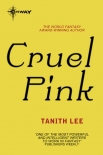Cruel Pink by Tanith Lee (ebook pc reader TXT) 📗

- Author: Tanith Lee
Book online «Cruel Pink by Tanith Lee (ebook pc reader TXT) 📗». Author Tanith Lee
Not so. In what I call the Secret Cave, which is tucked in by one of the main areas, a perilous-looking, but so far stable, island of floor leads among the standing shelves. It’s a library of preserved food. I have noticed, very oddly, that some of these supplies seem to re-establish themselves, as if many of the items in here are still being regularly delivered and restocked. At one time I suspected some remnant of government might be responsible, and that the goods were all booby-trapped or else laced with poisons, to clear the last of us out of the city. But I ate some extra things, and used others. Nothing happened. Unless, obviously, I am dead, and just don’t know it yet.
Below the floor-island, cliff-like tumbles of brickwork and crashed girders and beams—or whatever they are—statically collapse to a damp, weedy sub-basement.
(Last year I killed a woman here. I hit her with a wine bottle—there were plenty more—then broke her neck—simple enough, she was thin and not strong. She’d looked so sad, and so much happier and more peaceful afterwards. I dropped her down through some struts and she vanished in the deep dark below. No doubt there was the smell, but other things die here, even some of the food probably dies. It always smells.)
Today I, and my little companion, Micki, went about with my shopping list.
We got packets of bread-mix and dried egg, and jams and sweeteners and tea and coffee. After that we collected cans of veg and soup—and packets of dried fruit. There was even cotton wool, three big bags of it, and toilet paper. No one else appears to bother with that. But Micki, (forgetting again, I supposed, for a second), cried out that Sy and she always asked for toilet paper as a present. That and beer, she amended. Then remembered Sy had disappeared mysteriously and that was anyway why she had ended up in the Co-op with me.
At last, the pièce de resistance. A huge freezer that still worked, and which no one else ever appeared to know about. I selected ready-sliced ham and some lamb chops. Micki asked me, as if I owned the place, if she might lift some sausages.
“Take what you want,” I said kindly. “Everyone does.”
Maybe the pork sausages, their telepathic lure, would guide Sy home to her. Poor little thing.
There isn’t always alcohol. But there was. I picked up Vodka and another bottle of wine, but Micki only stared. She seemed to think she was—what?—imagining the goodies in the ruinous storeroom.
We now had quite a lot to carry. But we went out by the back way towards the High Street, or its remains. Four men were scavenging in the yard, where the big work lorries used to come in. Two vehicles still stood there, their sides ripped wide or blown open by home-made explosives. Almost everything was gone from them long ago. But people still find things. I once found a pack of smoked trout behind a bin, and still ice-cold. But it was winter then. I was lucky.
In the High Street my companion marvelled. I marvelled how she had never come this way before. How far off was the caravan where she and Sy had been living?
The bank on the corner had had another fire, I saw. The air smelled charred and little black flakes were even now filtering down from the drained sky. The butchers, once turned into a squat, had been for weeks trashed and vacated. We went into the tobacconists. I stopped smoking years back, and unlike most people, who boast they never lose their craving—like a loyal lover who will go on loving the denying beloved forever—I did lose the habit. A pity, because this place is packed with fags and tins of snout. Once the freezer worked in here too. But no more, and parts of the floor are cemented over by the white and pink death of ice creams.
Micki went on marvelling, and even pocketed two big packets of cigarettes. “I won’t take too much. Leave some for other people.” Bless her, the silly cow. “They’re for Sy,” she admitted, as we found the Diet Coke—it moves about, this, for some reason, and today was on the shelves of rotting magazines. “In case,” she murmured, “he ever comes back.”
“He probably will, you know,” I buoyantly told her.
“You really think so? Oh, I’m glad. I do too. Thank you. You’ve helped me such a lot.”
“Sorry we couldn’t find those guys I spoke to,” I apologised as we turned back for the house. “They’re up to something else, presumably.”
“Oh. It’ll be OK,” she said. She had bloomed suddenly with confidence.
I made a decision then. I would have to put my scruples aside and improvise a modus mortua. Plainly, while she was looking on the bright side, and before sorrow set in again, and bitter doubt, I had to kill her. It must be soon, this side of sunset, before the falling night arrived.
Rod:
36
My mother died, as I’ve said, when I was five. And my sister also died then, too. Tragic, for them. Although I, being so young, hardly knew them. But thinking back, in later years, I have abruptly accepted how comparatively odd my earliest childhood had been.
Even following the tragedy, my childhood continued to be rather bizarre. Only with my father’s death on the edges of Norway did my thirteen-year-old self graduate to what, I surmise, most of us would consider a saner scenario.
I have to add





Comments (0)